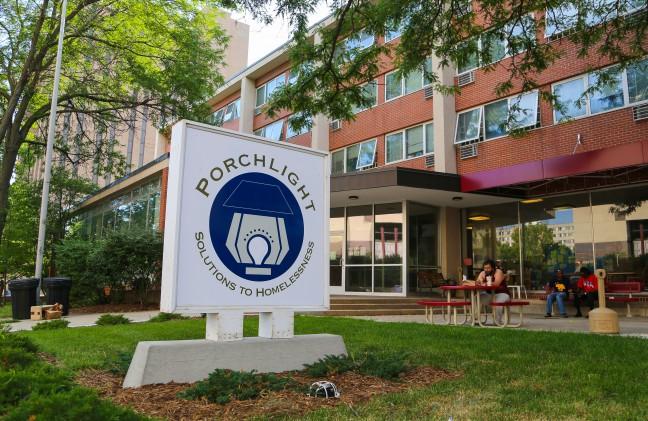Winter is always a busy season for homeless shelters in Wisconsin. But experts predict this winter will look completely different due to the complications COVID-19 brought to the housing crisis in Madison.
In fact, Porchlight Executive Director Karla Thennes said recently the upcoming winter currently looks like a “perfect storm” for the homeless population in Madison.
The ways in which the city and nonprofit groups alike deal with the homeless population has changed greatly since the start of the pandemic. In August, the Centers for Disease Control and Prevention came out with guidelines for groups to follow when dealing with homeless persons.
Physical distancing, symptom monitoring in shelters, removing at risk homeless people from high risk environments and avoiding increased contact with strangers ranked among the largest concerns — specifically when it comes to uprooting outdoor homeless encampments.
In response to the CDC guidelines, Madison Mayor Satya Rhodes-Conway passed an emergency order allowing many outdoor camps of homeless people to qualify as Temporary Permitted Establishments if they met specific criteria such as being located more than 500 feet from a residential area.
Many of the encampments that do not meet these guidelines, though, still remain unchecked and unenforced, Thennes said.
Thennes said Porchlight took many early steps to safely operate their men’s shelter.
“There was no physical distancing, people sleeping inches apart,” Thennes said of the shelter before the pandemic.
Originally located at 1625 Northport Drive, the city moved the men’s shelter temporarily to the Warner Park Community Recreation Center to allow for additional space for physical distancing.
Thennes said many protocols were put in place to protect the health of both the shelter’s residents and its workers. The shelter currently gets meals catered in and its laundry serviced to limit contact between individuals. Furthermore, the city sent in engineers to measure and set up cots properly distanced six feet apart, Thennes said.
While Thennes said the new location at Warner Park helped immensely, the Porchlight team had trouble helping symptomatic people seek shelter, so the city provided a trailer for the shelter to isolate symptomatic residents together. There is now also a group of volunteer nurses — called Nurse Disrupted — assessing those with symptoms via telenursing, coordinated by Porchlight.
The shelter consistently triages people for symptoms and does nightly health checkups to maintain its public health.
“It’s the safest place to seek shelter and work,” Thennes said. “Nobody enters with symptoms.”
While the new shelter allowed for physical distancing among shelter-seekers, it did not eliminate the imminent problems of dwindling federal resources and colder weather that experts expect to worsen the housing crisis.
Freezing temperatures create challenges for homeless shelters
Conflicts began to arise within TPEs, and come winter, Thennes said many people will try to seek shelter indoors from the cold weather. District 17 Ald. Samba Baldeh discussed the city’s upcoming plans to deal with the increased complications of the housing crisis created by the winter months.
Part of this includes a solution proposed by Baldeh to reverse the emergency order legalizing the outdoor encampments.
“I do not think we should let people camp like this [in the TPEs]. I don’t think the camps are healthy,” Baldeh said. “We need to humanize these people, work with them for alternative housing.”
Baldeh’s solution will also have to include finding alternative housing for those living in camps and asking the city to prepare a report on the impact these encampments have on their surroundings and prioritize their enforcement, Baldeh said. Furthermore, the solution will seek to determine how many hotel rooms the city can pay for and ask the city to reach out to the county for financial assistance.
Dane County launches plan to protect homeless amidst COVID-19 pandemic
Currently, the City is sheltering symptomatic and high-risk homeless people in hotels, paid for both by the city and by money received from the CARES Act according to the Cap Times.
But, this money has to be spent by the end of the year, and the federal government has yet to renew the funding. The biggest concern if they can’t renew of the money, Thennes said, is where the nearly 400 high-risk homeless persons will shelter since they’d lose their source of money for the hotel rooms.
“It is just not safe for them to be in a masked shelter,” Thennes said.
Another concern surrounding the renewal of federal money is how to prevent new evictions from happening. Throughout the pandemic, the country saw many businesses struggling to stay afloat and extremely high unemployment rates. Early on, the city received a large sum of money allocated toward eviction prevention. Now, that money has run out while people are still struggling with work, Thennes said.
Without these funds, shelters could reach capacity even quicker than expected, Thennes said. Luckily, Baldeh said he is optimistic about the renewal of these eviction assistance dollars.
“I can not see the federal government not renewing that eviction money,” Baldeh said.
Baldeh said even if the federal government withholds money in the future, the city will continue to support the housing crisis the same way it always has. According to Baldeh, the city has been using storage facilities as housing, bolstering shelters such as Porchlight and working to expand affordable housing for years.
“Housing is a basic human right. It is the responsibility of the government to be there for them,” Baldeh said. “I hope the government will continue to understand that.”
















